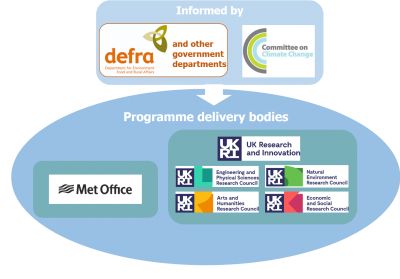What was the SPF UK Climate Resilience Programme?
The UK Climate Resilience Programme (UKCR) was a four-year Strategic Priorities Fund (SPF) scientific research programme led jointly by UK Research and Innovation (UKRI) and the Met Office. Natural Environment Research Council (NERC) led for UKRI on behalf of Arts and Humanities Research Council (AHRC), Economic and Social Research Council (ESRC) and Engineering and Physical Sciences Research Council (EPSRC). The UKCR programme was represented by co-Champions Prof Suraje Dessai and Dr Kate Lonsdale at the University of Leeds, with a small team of support staff. Prof Jason Lowe was the Met Office Science Co-ordinator. (See: Meet the Team.)

What was UKCR trying to achieve?
We now have a great deal of evidence that climate variability and change is affecting all sectors of society through both human and natural systems – and the risks will increase as the planet warms due to human-driven emissions of greenhouse gases. In even the most optimistic scenarios of reduced greenhouse gas emissions we will have to adapt our world to this increased variability through improving our capacity to deal with change and make decisions, despite uncertainty as to what the future climate might be like. The UKCR Programme funded interdisciplinary research to help understand how to quantify the risks from climate change and build climate resilience for the UK. It produced usable outputs to directly support decision-making. (See: About and The Science Plan.)
How was UKCR funded?
The UK Climate Resilience Programme was funded under Wave 1 of the Strategic Priorities Fund (SPF). UKCR received £18.65m from the SPF, which is a common fund to drive an increase in high-quality, multi- and interdisciplinary research and innovation across 34 themes. The Strategic Priorities Fund, which has a total value of £830m, provides an excellent opportunity for delivery partners from UKRI and Public Sector research establishments to work collaboratively, bringing together different disciplines to address research that aligns strategically with government research priorities on climate resilience in the UK. (See: Funding.)
How was UKCR structured?
UK Climate Resilience was managed by a Programme Board, which had representation of both UKRI and the Met Office. A Steering Committee composed of senior representatives from policy, the academic community, business leaders and UK Climate Resilience Champions advised the Programme Board and helped to develop the science plan. The Programme Board had oversight of planning, finances, risks, and monitoring and evaluation, and made decisions around the scope of work packages and calls. The Steering Committee provided strategic advice to the Programme Board to support the programme objectives. (See: Management.)
Who made decisions on which projects were selected / important?
Delivery of investments was split between UKRI and Met Office.
Those led by UKRI were directly commissioned multidisciplinary research from UKRI research community using established UKRI peer-review processes.
The Met Office defrayed UK Climate Resilience Programme grants to Beneficiaries by three routes: 1) Open Call, 2) Single Tender Met Office and 3) Single Tender External. Each of these grants required approval by an independent SAG (Science Assurance Group), which assessed the impact and quality of the scientific research and provided the first line of quality assurance for science supported by the UKRI Strategic Priorities Fund. A Route to Market (RTM) assessment was then undertaken to provide a decision on the most appropriate route of defrayment for each grant under the SPF Programme activities. This RTM assessment defined the science standards for the delivery of the SPF Projects, provided initial assurance against these standards, and identified opportunities to maximise/realise the value of science across the programmes. The RTM ‘ownership’ model is separate from the Met Office’s Science teams, which effectively distances the RTM decision from the teams within the Met Office who may undertake related project work. This is in order to ensure fairness and transparency in the decision-making process. Click here for more information about the Met Office grant funding processes.
The Programme Board and Steering Committee retained a strategic overview of investments to ensure overall coordination and integration of activities to maximise impact, value, legacy, and benefits.
What kinds of projects did UKCR fund?
The UKCR Programme has funded over 60 projects and four Met Office work packages since its inception in late 2018. Information about them all, along with the names of the principal investigators, partner organisations and amount of funding each received, can be found on the Projects pages.
The range of projects the programme funded was necessarily broad. Our research requires multi- and inter-disciplinary efforts that includes the natural sciences, social sciences, engineering, the arts and humanities and the engagement and involvement of a wider range of stakeholders (e.g., practitioners and policymakers).
What legacy will UKCR leave?
- A step change in future Climate Change Risk Assessment capability, including characterisation of interdependent risks and representation of adaptation strategies in integrated assessment models of impact and adaptation.
- Enhanced capability and understanding of climate hazard and risk, through consideration of past, present day and future risks to the UK, including understanding robustness of methods, single and multi-hazard events, and producing high-end scenarios for national stress testing. This will enhance the UK’s current decision-relevant climate scenarios from other sources such as UKCP18 and CMIP6.
- Strengthened understanding of how people, organisations and policy scales are adapting and how system scale interactions can act to incentivise adaptive behaviour, remove barriers, and avoid maladaptation.
- Consistent set of UK socio-economic scenarios for national, regional and local risk planning and research.
- UK roadmap for the future development and implementation of climate services addressing the roles of public and private sectors. This provides the UK response to the Global Framework for Climate Services.
- A community of interacting researchers, practitioners, and policymakers in climate resilience.
- Synthesis of findings across the programme to provide updated national guidance standards, policy regulations and good practice.
